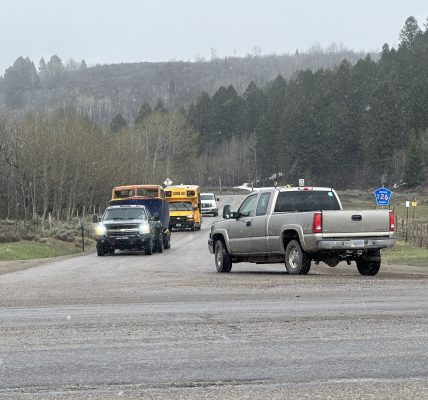
• Mihara speaks on Japanese imprisonment at Heart Mountain, lessons for the future
By Peder Schaefer
Buffalo Bulletin
Via- Wyoming News Exchange
For years Sam Mihara has gotten the same question.
“Are you bitter?”
Is he bitter that he was imprisoned for three years during World War II in Heart Mountain for being of Japanese descent, that his grandfather died in the camp or that his father went blind due to the lack of good medical care?
“Eventually it dawned on me,” Mihara said, sitting in the Busy Bee Cafe in Buffalo before a long day of presenting and answering questions in Buffalo about his experience as a prisoner at the Heart Mountain near Cody. “Why have such a grudge of bitterness for so long? How does that help? It’s much more satisfying to focus on telling this story to young people.”
Mihara is traveling across eastern Wyoming this month, bringing his story of unjust imprisonment, later professional success and cautionary lessons for the future to a new generation of Wyomingites.
While Buffalo is the first stop on his trip, he is also traveling to Sheridan, Gillette, Laramie, Glenrock, Casper, Douglas and Heart Mountain over the course of his week-long stint in Wyoming.
His travels are being paid for by a grant from the Wyoming Humanities Council, which is allowing Mihara to share his story at little or no cost to local communities.
When he’s not traveling making presentations, Mihara lives in southern California, where he is retired after a long career as a rocket scientist specializing in satellites with Boeing.
“It’s such an important part of our history,” said Jim Gatchell Memorial Museum director Sylvia Bruner, who helped coordinate Mihara’s visit to Buffalo, and remembered the community support for Mihara’s last Buffalo presentation in 2018. “It’s a very tough story. But he handles it with such an amazing amount of grace and forgiveness.”
For over a dozen years Mihara has traveled around the world, giving his talk on his experience in Heart Mountain to over 100,000 students in the United States, Europe and Asia.
A full auditorium of Buffalo High School students listened to Mihara’s nearly hour-long presentation in the afternoon, and later in the evening the auditorium filled again with adults interested in the presentation.
Student and adult attendees asked questions about the racism Mihara and his family faced in San Francisco after he returned from the camp, how the federal government identified people of Japanese descent to imprison and what other prison camps could be visited across the country. The incarceration of Japanese Americans during World War II occurred after the bombing of Pearl Harbor on Dec. 7, 1941. A few months later in February 1942 President Franklin D. Roosevelt signed executive order 9066, which prescribed special “military areas” and left it up to his military commanders to decide which people should be excluded from those areas.
In the weeks and months that followed, the U.S. military under General John DeWitt forcibly removed over 112,000 Japanese Americans – two-thirds of whom were U.S citizens – from their homes on the West Coast and sent them to prison camps across the country.
While Germany and Italy had also declared war on the U.S., it was only people of Japanese descent that were imprisoned during the war.
Mihara was only 9 years old when Japan attacked Pearl Harbor. Within months, Mihara and his family were forced from their San Francisco home and sent to Heart Mountain. For three years the young Mihara and his family lived in a 20 by 20 square foot room, braving frigid Wyoming winters and poor food.
During his talk Mihara showed pictures by the famous American photographer Dorothea Lange, including one from Mihara’s own elementary school of young Japanese-descended kids saying the Pledge of Allegiance.
“When an armed guard comes to your house and puts you in a prison without any good reason, except for your race and background, you have been violated of your most important constitutional rights,” Mihara said.
He also told of how over 50 years after the imprisonment, Japanese Americans fought for an apology and redress to the wrongs of the federal government. It wasn’t until 1988 that President Ronald Reagan signed a bill apologizing for the imprisonment and providing $20,000 in reparations to all prisoners who were still alive.
Mihara’s interest in telling his story to youth began nearly a dozen years ago, when he was asked by the U.S. Department of Justice to tell his story of imprisonment at Heart Mountain to a group of government attorneys in Cheyenne. The presentation went so well that pretty soon Mihara was traveling across the country, telling his story to DOJ officials. Later, he expanded to schools, and later published a memoir of his experiences in the camp, “Blindsided: The Life and Times of Sam Mihara.”
But while Mihara said that his talk was important because it reminded people of the past, he also said that the story of Japanese imprisonment carries important lessons for today.
“This was caused by a combination of hate, hysteria and leaders who didn’t want to follow the Constitution,” Mihara said of the initial Japanese imprisonment. “So my message for today is, watch out.”
He said that the imprisonment of a race or religious group should never happen, and pointed to the poor conditions in detention camps on the southern border of the U.S. as a worrisome development.
He also wondered if the state of Wyoming would ever formally apologize for assisting in the internment of Japanese Americans, as other states such as California and the federal government have done.
Mihara said, “never again to anyone at all.”





